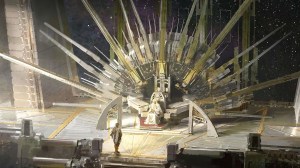The third volume of writer Mark MIllar’s Prodigy arrives this week with a new publisher (shifting from Image to Dark Horse) and a new sub-title, Slaves of Mars. The first issue reintroduces readers to Edison Crane, the world’s smartest and richest man until the story inevitably requires seemingly smarter or wealthier men to challenge him (and it’s always men in this series). Edison is a character who arrives on the page fully formed, which is to say two-dimensional, in a debut that only provides readers cause to seek out better comics.
Videos by ComicBook.com
Prodigy: Slave of Mars #1 emphasizes Edison’s familial relations, introducing his father in a flashback sequence at the issue’s start and setting the stage for a mysterious older brother. Edison remains unchanged whether he’s depicted as an adolescent or grown man, though. It’s not sufficient that he is as intellectually, economically, and physically blessed as the most indulgent imaginings of Batman, he has to constantly remind everyone around him and the reader that this is the case. Whether he’s arriving to rescue his kidnapped father or sailing home aboard a cruise ship, every scenario becomes an opportunity for Edison to explain in dialogue exactly what he’s doing and how it makes him superior.
This sort of egoism goes unacknowledged in the issue as everyone who interacts with Edison, besides the issue’s villain, responds with awe even when he makes mistakes. There’s a sense on the page that readers should embrace this godlike figure and celebrate him because of his incredible accomplishments. But there’s nothing substantial to what is being explained; whether it’s a world-saving idea or Olympian feat, every success is primarily delivered in expository dialogue that hardly differentiates Edison from those around him. The comic book seems to be shouting at readers about how cool its protagonist is without offering much cause to follow their story.
The action sequences and imaginative settings that are shown on the page are all adequately depicted by artist Stefano Landini (replacing Matteo Buffagni from Prodigy: The Icarus Society). There’s never any uncertainty about what’s unfolding and Landini shows a knack for distilling expressions into a few essential lines. Unfortunately, there are no expansive setpieces or emotive sequences to showcase Landini’s skills, reducing their contributions to laying out the bones of a truly skeletal script.
It would be enough to dismiss Prodigy: Slaves of Mars as banal, boring, bland, or any number of synonyms further down the alphabet, like so many other superhero comics that declare its hero exceptional without bothering to develop them as an interesting character. However, Slave of Mars possesses an uncomfortable subtext that makes its subtitle read like a red flag.
Nearly all of the named characters in the issue are black with the only notable exceptions being a pair of tourists, staff at Edison’s company, and a villain complete with twirled mustache. Edison is implicitly exceptional not only because he is the best at everything he tries, but because he is black. This connection is highlighted by every other black character who appears in the issue. It opens with African warlords seemingly dedicated only to murder and pillage without motive and closes with Edison’s brother shown smoking in a trap house and speaking a form of Ebonics filled with racist assumptions.
The effect of this is to contrast Edison with his own race and Millar’s depiction of black individuals across the globe is overloaded with racist imagery and ideas. It’s deeply uncomfortable upon first reading and subsequent readings only confirm this ugly worldview embedded in the issue’s pages. In the world of Prodigy an exceptional black hero reads as outlandish even in the genre of superhero comics, while every other consideration of blackness reflects some of the nastiest stereotypes imaginable; the result is an exceedingly ugly comic book.
Published by Dark Horse Comics
On August 7, 2024
Written by Mark Millar
Art by Stefano Landini
Colors by Michele Assarasakorn
Letters by Clem Robins
Cover by Stefano Landini and Michele Assarasakorn








